
The survey (2019-2020) shows that court fees in most courts are charged per case basis (either 400 CNY or 500 CNY), rather than in proportion to the subject matter amount, which is undoubtedly good news for those wishing to enforce foreign arbitral awards.
How much you need to pay, if you want to apply for recognition and enforcement of a foreign arbitral award in China? In the earlier post, our study shows that the court costs are no more than 1.35% of the amount in controversy or 500 CNY.
But should the court cost be 500 CNY or more? In this post, we will try to demystify the court fees by discussing the relevant legal basis and courts’ judicial practices.
The standard of court fees about foreign arbitral awards in China was first introduced in the 1998 Provisions of the Supreme People’s Court on Issues Concerning Fees and Review Period for Recognition and Enforcement of Foreign Arbitration Awards (最高人民法院关于承认和执行外国仲裁裁决收费及审查期限问题的规定) (“the 1998 Provisions”).[1] According to the 1998 Provisions, the people’s court shall charge 500 CNY in advance if the parties apply only for recognition of foreign arbitral awards; and shall charge in advance based on the amount to be enforced or the amount of the subject matter if the parties apply for both recognition and enforcement of a foreign arbitration award.
In 2006, China’s Ministry of Commerce issued the Measures for the Payment of Litigation Fees (诉讼费用交纳办法) (“the 2006 Measures”). [2] Pursuant to the 2006 Measures, parties applying for the recognition and enforcement of foreign arbitral awards shall pay court fees that are calculated based on the amount of the subject matter of the case by a progressive method (Article 14, "2006 Measures"). Since then, the 1998 Provisions and the 2006 Measures have both been the basis for court fees for the recognition and enforcement of foreign arbitral awards in China. It is worth noting that the two standards of court fees are not contradicting each other, because the 1998 Provisions only stipulate the prepayment of court fees.
It was not until 20 July 2019 that the Supreme People’s Court (SPC) formally abolished the 1998 Provisions.[3] Since then, the court fees for the recognition and enforcement of foreign arbitral awards in China have been collected in accordance with the provisions of the 2006 Measures.
Comparing the enforcement (and recognition) of foreign arbitral awards and that of domestic arbitral awards, in accordance with 2006 Measures, it can be seen that the fees for the two types of cases are the same, both applying Article 14 of the 2006 Measures. In addition, the application fees for the two types of awards shall be paid by the party subject to enforcement (Article 38, "2006 Measures"). However, the difference lies in that for the recognition and enforcement of foreign arbitral awards in China, the applicant must prepay the application fee, whereas applying for the enforcement of domestic arbitral awards does not require such prepayment, the court fees of which are paid after the enforcement (Article 20, "2006 Measures").
But in fact, Chinese courts do not follow a unified charging standard of recognition and enforcement of foreign arbitral awards. In other words, it seems that Chinese courts do not strictly follow the 2006 Measures to collect court fees.
According to our survey of the charging standard that Chinese courts adopted from 2019 to 2020, the data of which come from all public rulings made by relevant courts on the recognition and enforcement of foreign arbitral awards, we did an analysis on the charges of court fees. 22 courts are involved in this survey, and their charging standards can be divided into the following three categories: (1) charging a fixed fee (per case basis); (2) charging in proportion to the subject matter amount; (3) charging on a mixed basis, namely, being collected by case or being collected in proportion of the subject matter amount.
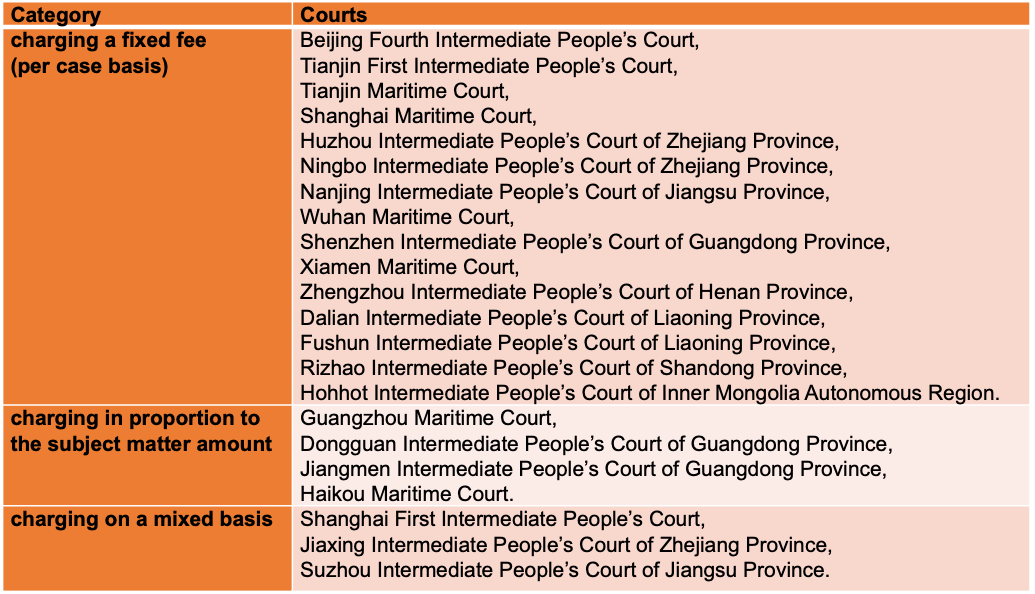
(1) Charging a fixed fee (per case basis). There are 15 courts mostly charging by case, and the court fees are within 500 CNY, either 400 CNY or 500 CNY, irrelevant to the subject matter amount of the cases. Taking Shenzhen Intermediate People’s Court of Guangdong Province and Xiamen Maritime Court as examples, their court fees for the recognition and enforcement of foreign arbitral awards are all 500 CNY. The number of cases is as follows:
Shenzhen Intermediate People’s Court of Guangdong Province
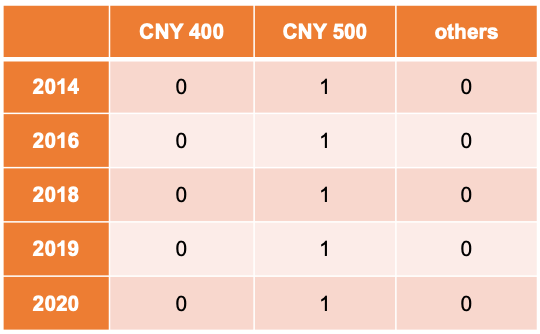
Xiamen Maritime Court
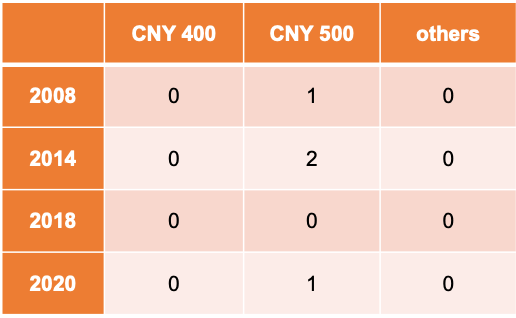
(2) Charging in proportion to the subject matter amount. There are four courts charging fees in proportion to the amount of the subject matter. Taking Guangzhou Maritime Court as an example, the application fees for recognition and enforcement of foreign arbitral awards are almost all charged proportionally. The number of cases is as follows:
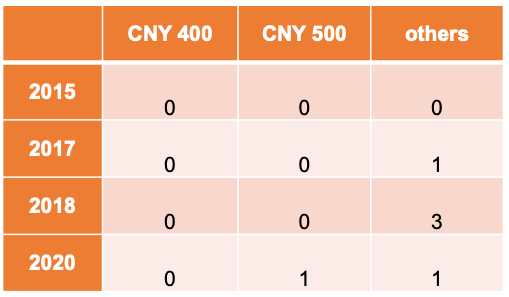
(3) Charging on a mixed basis. There are three courts charging fees on a mixed basis, that is, the charging standards for each case are not uniform. The case of case-based fees and proportional fees each account for about 50%. Taking the Shanghai First Intermediate People’s Court as an example, the number of cases is as follows:
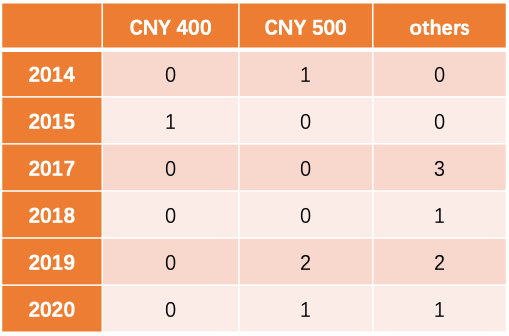
To sum up, it can be seen that courts in China have different charging standards for the recognition and enforcement of foreign arbitral awards. Most courts have formed a relatively uniform charging standard in practice, that is, charging by case or charging in proportion to the subject matter amount, but the charging standards of a few courts are still not uniform.
As for the standard of charging by case, the courts seem to refer to the 1998 Provisions about the prepayment standard for application for only recognition. However, the courts in our survey not only apply the 1988 Provisions to cases about the application for only recognition, but also cases about the application for both recognition and enforcement of foreign arbitral awards.
It is worth noticing that the court fees (500 CNY or 400 CNY) are generally much lower than the amount charged in proportion to the subject matter amount. Most courts (about 68%) adopted such an approach, which is undoubtedly good news for applicants.
References:
[1] 最高人民法院关于承认和执行外国仲裁裁决收费及审查期限问题的规定(法释〔1998〕28号), http://cicc.court.gov.cn/html/1/219/199/201/699.html
[2]《诉讼费用交纳办法》(中华人民共和国国务院令第481号), http://www.gov.cn/zwgk/2006-12/29/content_483407.htm
[3] 最高人民法院关于废止部分司法解释(第十三批)的决定(法释〔2019〕11号), http://rmfyb.chinacourt.org/paper/images/2019-07/19/03/2019071903_pdf.pdf
Contributors: Meng Yu 余萌 , Ruida Chen 陈锐达









